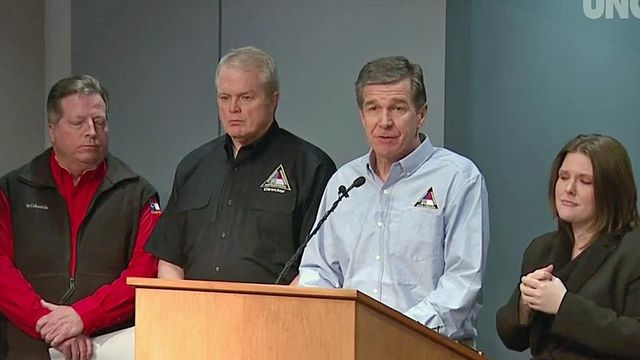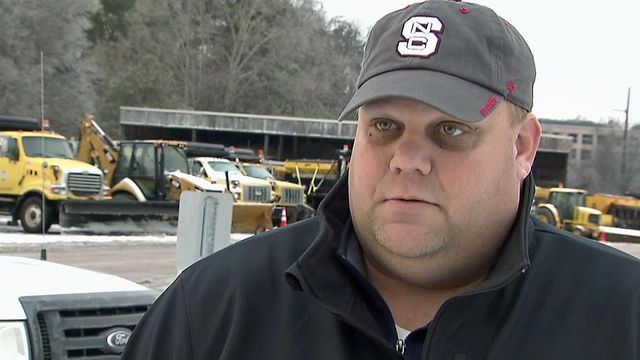Roads conditions across central NC worsen as temps fall overnight
Road conditions will only worsen after the sun sets, due to plummeting temperatures and a light yet effective snow that added an additional blanket of accumulation to the roadways Saturday afternoon.
Posted — UpdatedOfficials in police departments and other agencies from multiple counties in N.C. have cautioned the public of one thing all day: avoid driving at all costs. The warning will become even more important overnight, as temperatures plummet into the single digits, promising to freeze any precipitation that is leftover on the roads.
With a wintry mix of snow, slush and freezing rain on the roads, officials are cautioning motorists that it's difficult to know what kind of slippery conditions are under the snowy surface. It's really best to not drive at all, they say.
Although the snow in Raleigh is expected to stop within hours, sooner for counties to the west, temperatures dropping into the teens Saturday evening and the single digits by Sunday morning will ensure the wintry mix sticks.
"Temperatures are going to be so cold that it will be hard to get rid of this snow," said Gardner. "Temperatures will dive down to 9 degrees at 8 a.m. on Sunday, and we could break a record Monday."
Though all roads with wet spots will become slippery as temperatures drop, conditions are poorest in the areas that saw the most accumulation.
That means counties northwest of Raleigh, including Orange and Durham counties, where 6 or more inches of snow were reported in multiple areas.
Even in Raleigh, which saw no more than 2 inches of snow, a second dusting of snow covered primary and secondary roads to the point where it is hard to see the lane dividers.
Although towns in Cumberland County and surrounding areas saw less snow than we did in the Triangle, some snow and rain did fall, which will likely freeze as temperatures fall.
All roads will be slick, posing danger to drivers and passengers, officials said.
Although roads still have the potential to be slick, workers with the Department of Transportation have been working to clear many main thoroughfares. Plows start with the largest, most-traveled roads first, like the four-lane interstates, then move to the smaller yet significant roads that take drivers to those main roads. Secondary roads and neighborhood streets follow.
Due to less accumulation, highways in Raleigh and Cary were clearer than those running through Durham and Chapel Hill, but officials are still warning motorists to avoid driving. If you must drive, drive slowly and keep ample distance between your car and other cars, officials said.
- Clear your vehicle's windows and mirrors.
- Reduce your speed. Driving at the regular speed limit will reduce your ability to control the car if you begin to slide. Do not use cruise control.
- On a four-lane highway, stay in the clearest lane and drive only in paths that are already cleared. Do not try to change lanes.
- Leave plenty of room between you and other vehicles. Highway safety experts recommend keeping the distance of four cars between you and other vehicles for every 10 mph you're driving.
- Bridges and overpasses accumulate ice first. Approach them with extreme caution, and do not apply your brakes while on the bridge.
- If you do begin to slide, take your foot off the gas, and turn the steering wheel in the direction of the slide. Do not apply the brakes as that will cause further loss of control of the car.
- Come to a complete stop or yield the right-of-way at intersections where traffic lights are out. Treat this situation as a four-way stop.
- If you have a cellular phone, take it with you. You can call the Highway Patrol statewide by dialing *HP (*47) or call the local county emergency center by dialing 911. Call 511 for information about highway travel conditions; do not call 911 for that information.
If you become trapped in your car:
- Pull off the highway; stay calm, and remain in your vehicle. At night, turn on the inside dome light, so work and rescue crews can see you.
- Set your directional lights to "flashing," and hang a cloth or distress flag from the radio aerial or window. In a rural or wilderness area, spread a large cloth over the snow to attract attention of rescue crews who might be surveying the area by airplane.
- Do not set out on foot unless you can see a building close by where you know you can take shelter.
- If you run the engine to keep warm, open a window slightly for ventilation. This will protect you from possible carbon-monoxide poisoning. Periodically, clear away snow from the exhaust pipe.
- Exercise to maintain body heat, but avoid overexertion. In extreme cold, use road maps, seat covers and floor mats for insulation. Huddle with passengers, and use your coat as a blanket.
- Never let everyone in the car sleep at once. One person should stay awake to look out for rescue crews.
- Be careful not to use battery power. Balance electrical energy needs – the use of lights, heat and radio – with your supply.
If you are involved in a wreck, here are some ways to prevent further injuries, reduce costs and speed up the repair process:
- Protect yourself from the start. Use your cell phone or a camera to take photos of the scene and the vehicles involved.
- Move the vehicles and all of the people involved well out of the way so they don't cause another wreck.
- Before you have your vehicle towed to a repair shop, get references and check the shop's status with the Better Business Bureau.
- Since the average crash repair costs more than $2,200, get a written estimate before any work begins.
- Have patience. Severe weather often means it will be busy at auto repair shops.
- If the wreck is minor, you and the other driver might decide to handle the damages without involving insurance companies. There are risks, however: You or the other driver might later change your mind; the other driver might claim injuries, and that could create more problems than just higher insurance rates.
WRAL has received no word of road closures on major thoroughfares. Around the Triangle, the slick roads contributed to several fender benders and lane closures throughout the day.
• Credits
Copyright 2024 by Capitol Broadcasting Company. All rights reserved. This material may not be published, broadcast, rewritten or redistributed.






